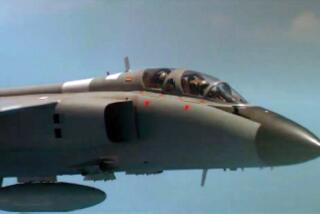U.S. Bars A-Arms in Its Ports, China Says
- Share via
WASHINGTON — Chinese officials, tackling a particularly sensitive diplomatic and military issue, said in Peking on Wednesday that the United States has assured them that a U.S. Navy destroyer visiting China will not carry nuclear weapons.
Their statement, to a group of reporters from Australia and New Zealand, raised questions about the Reagan Administration’s adherence to longstanding U.S. policy to neither confirm nor deny the presence of nuclear weapons aboard U.S. ships.
The refusal of the Administration to promise New Zealand that U.S. Navy ships making port calls there would carry only conventional armaments led the government of Prime Minister David Lange to refuse to accept such a visit, causing a rift in U.S. military cooperation with New Zealand.
Former Pentagon officials, while saying they were not up to date on the plans for the port call in China, said that other nations have been given no assurances by U.S. officials about the weapons aboard visiting vessels. They added that they would be surprised if the policy has been shifted to accommodate the Chinese, who are awaiting the first visit by a U.S. Navy ship since 1949.
“We use it with everybody. It seems unlikely we’d change it for the Chinese,” one former Pentagon official said, speaking on the condition that he not be identified.
The Chinese statement was made by Hu Yaobang, Chinese Communist Party general secretary, and Vice Foreign Minister Zhu Qizhen, during an interview. Their comments were reported by wire services on the basis of a taped transcript.
U.S. and Chinese officials agreed late last year on a symbolic port call by a U.S. ship, the first since a Navy vessel left the Shanghai harbor with its guns trained on advancing Communist troops nearly 36 years ago. The visit, possibly by a destroyer of the 7th Fleet, was originally scheduled for this month but has been postponed until May.
Zhu told the reporters that the date of the visit is still being discussed. He added that the visit would be informal and would involve “a conventional warship.”
When asked whether that meant that the ship would not carry nuclear weapons, Hu replied, “That is the way it should be understood,” the Associated Press reported.
Zhu said that the United States and China had reached an understanding and were in agreement.
An Asian security expert, speaking anonymously, said the Chinese remarks raised questions about the naval role that China sees for the United States in the Pacific, in view of the problems that the New Zealand action had created for the ANZUS (Australia-New Zealand-U.S.) alliance.
“It can’t be in China’s interest to have the anti-nuclear movement stoked up and the United States so constrained in Asia that the Soviets operate with so much less of a counterweight,” he said.
However, he noted that China, a nuclear power, had supported New Zealand in its dispute with the United States.
Meanwhile, after several hours of conferences between State Department and Pentagon officials, the Pentagon refused to address the Chinese leaders’ remarks, issuing a statement that “the United States’ policy of neither confirming nor denying the presence of nuclear weapons on its ships remains unchanged.”
More to Read
Sign up for Essential California
The most important California stories and recommendations in your inbox every morning.
You may occasionally receive promotional content from the Los Angeles Times.













